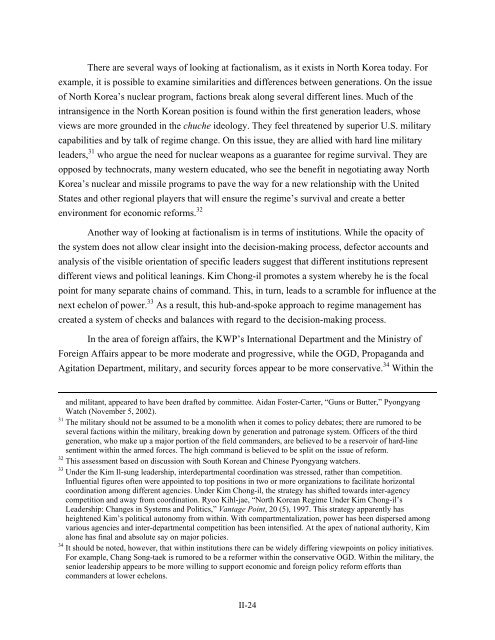North Korean Policy Elites - Defense Technical Information Center
North Korean Policy Elites - Defense Technical Information Center
North Korean Policy Elites - Defense Technical Information Center
Create successful ePaper yourself
Turn your PDF publications into a flip-book with our unique Google optimized e-Paper software.
There are several ways of looking at factionalism, as it exists in <strong>North</strong> Korea today. For<br />
example, it is possible to examine similarities and differences between generations. On the issue<br />
of <strong>North</strong> Korea’s nuclear program, factions break along several different lines. Much of the<br />
intransigence in the <strong>North</strong> <strong>Korean</strong> position is found within the first generation leaders, whose<br />
views are more grounded in the chuche ideology. They feel threatened by superior U.S. military<br />
capabilities and by talk of regime change. On this issue, they are allied with hard line military<br />
leaders, 31 who argue the need for nuclear weapons as a guarantee for regime survival. They are<br />
opposed by technocrats, many western educated, who see the benefit in negotiating away <strong>North</strong><br />
Korea’s nuclear and missile programs to pave the way for a new relationship with the United<br />
States and other regional players that will ensure the regime’s survival and create a better<br />
environment for economic reforms. 32<br />
Another way of looking at factionalism is in terms of institutions. While the opacity of<br />
the system does not allow clear insight into the decision-making process, defector accounts and<br />
analysis of the visible orientation of specific leaders suggest that different institutions represent<br />
different views and political leanings. Kim Chong-il promotes a system whereby he is the focal<br />
point for many separate chains of command. This, in turn, leads to a scramble for influence at the<br />
next echelon of power. 33 As a result, this hub-and-spoke approach to regime management has<br />
created a system of checks and balances with regard to the decision-making process.<br />
In the area of foreign affairs, the KWP’s International Department and the Ministry of<br />
Foreign Affairs appear to be more moderate and progressive, while the OGD, Propaganda and<br />
Agitation Department, military, and security forces appear to be more conservative. 34 Within the<br />
and militant, appeared to have been drafted by committee. Aidan Foster-Carter, “Guns or Butter,” Pyongyang<br />
Watch (November 5, 2002).<br />
31 The military should not be assumed to be a monolith when it comes to policy debates; there are rumored to be<br />
several factions within the military, breaking down by generation and patronage system. Officers of the third<br />
generation, who make up a major portion of the field commanders, are believed to be a reservoir of hard-line<br />
sentiment within the armed forces. The high command is believed to be split on the issue of reform.<br />
32 This assessment based on discussion with South <strong>Korean</strong> and Chinese Pyongyang watchers.<br />
33 Under the Kim Il-sung leadership, interdepartmental coordination was stressed, rather than competition.<br />
Influential figures often were appointed to top positions in two or more organizations to facilitate horizontal<br />
coordination among different agencies. Under Kim Chong-il, the strategy has shifted towards inter-agency<br />
competition and away from coordination. Ryoo Kihl-jae, “<strong>North</strong> <strong>Korean</strong> Regime Under Kim Chong-il’s<br />
Leadership: Changes in Systems and Politics,” Vantage Point, 20 (5), 1997. This strategy apparently has<br />
heightened Kim’s political autonomy from within. With compartmentalization, power has been dispersed among<br />
various agencies and inter-departmental competition has been intensified. At the apex of national authority, Kim<br />
alone has final and absolute say on major policies.<br />
34 It should be noted, however, that within institutions there can be widely differing viewpoints on policy initiatives.<br />
For example, Chang Song-taek is rumored to be a reformer within the conservative OGD. Within the military, the<br />
senior leadership appears to be more willing to support economic and foreign policy reform efforts than<br />
commanders at lower echelons.<br />
II-24













